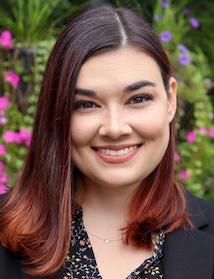by Michael Friedrich
Recently, the Social Science Research Council (SSRC), with support from Arnold Ventures (AV), launched the Criminal Justice Innovation (CJI) Fellowship program, which supports early-career researchers who are exploring what works to make communities safer and the criminal justice system fairer and more effective.
In part five of a new series profiling the CJI fellows, AV spoke with Emma Rackstraw who recently completed a PhD in public policy at Harvard and will start as an assistant professor of economics at Swarthmore College in 2025.
Emma Rackstraw: Inequitable Decision Making
Before entering the PhD program at Harvard, Rackstraw led the crime and political economy and governance sectors at J‑PAL North America, a research center working to reduce poverty. Today, her research focuses on understanding the decision-making processes and incentive systems of key actors in the labor market and criminal justice system, as well as how those decisions interact with systemic inequities.

Rackstraw explains that spending time in correctional facilities as part of her work with J‑PAL made it clear how the criminal justice system in America intersects with many forms of discrimination and inequality. “Getting to spend extended periods of time with incarcerated people,” she says, “really drove home for me the urgency and importance of trying to find ways to bring as many of those people back into our communities as possible while keeping both them and the rest of society safe.”
In 2023, Rackstraw studied reality TV shows that feature policing, like Cops and Live PD, asking how such shows affect police and community perspectives. Focusing on Live PD, she found that the presence of TV cameras in a department creates a selective view of policing. In particular, it increases arrests for low-level offenses by nearly 20 percent. Meanwhile, she conducted a survey which found that 90% of Americans have been exposed to the distorted vision of policing depicted in such shows.
“Hundreds of police departments and sheriff’s offices have filmed with these shows over the last 30 years,” Rackstraw explains. “I realized there was a lot of potential for these shows to affect not just millions of viewers, but also many thousands of police officers and the communities that those officers patrol.”
As part of the new SSRC fellowship, Rackstraw hopes to expand her work on the effects of reality TV featuring police, particularly how it impacts recruitment. Rackstraw intends to use police academy and application data to explore questions about who is being attracted to the occupation based on the distorted vision of policing presented by shows like Live PD.
Rackstraw will also launch a new research project on how criminal histories affect people’s employment prospects in the labor market. Through an agreement with a large background check company, she and her co-authors have access to a massive administrative data set detailing the hiring practices of a range of companies over the last eight years. Rackstraw will use this data to understand how firms respond to candidates’ criminal histories.
Teasing out these research questions is important, Rackstraw says, because the criminal justice system can have such dire socioeconomic consequences. She hopes that her work will help policymakers implement policies that improve equity in policing, reduce unnecessary arrests, and remove barriers to employment. “There are so many people affected, and the stakes are so high,” she says. “We’re talking about a system that can limit people’s freedom, as well as the way that people make a living in the formal labor market.”
